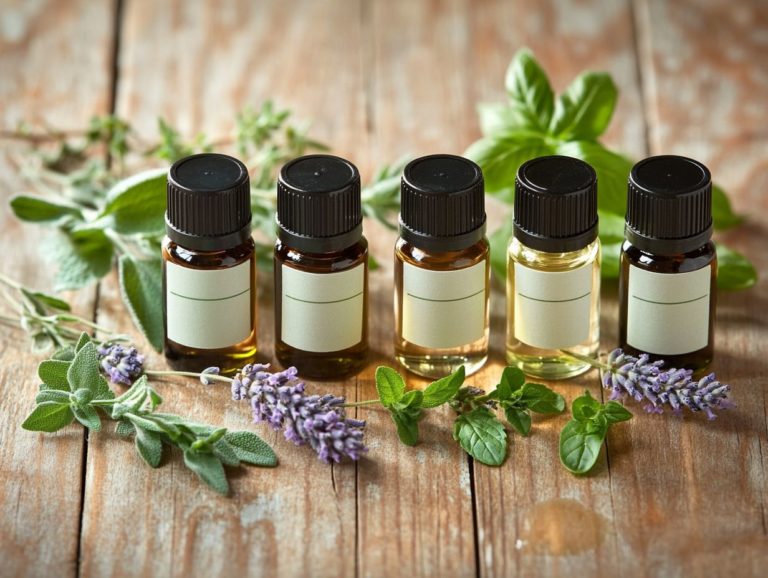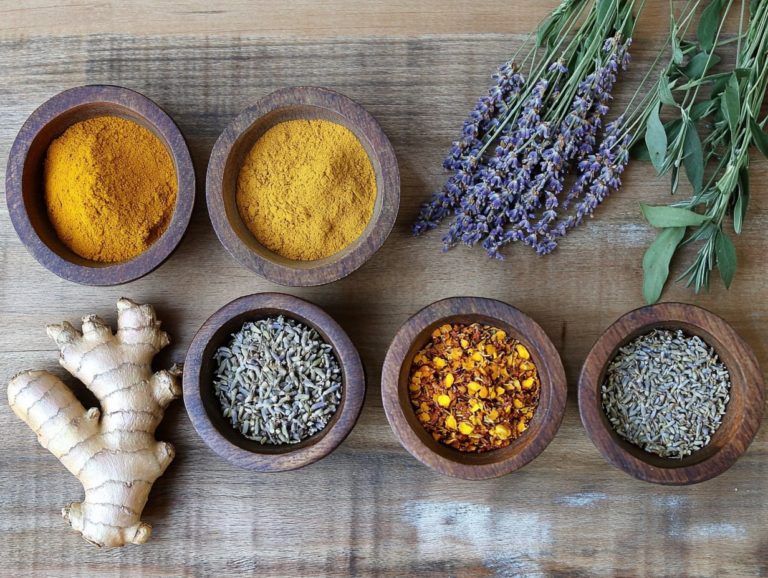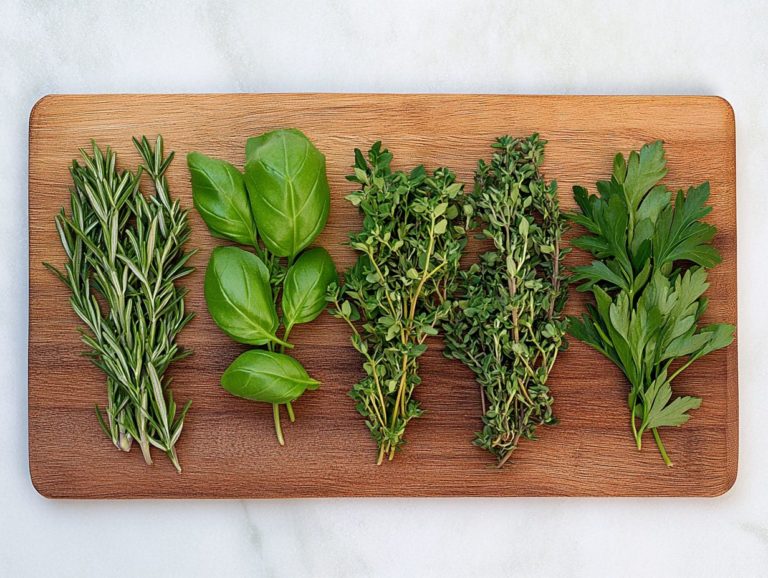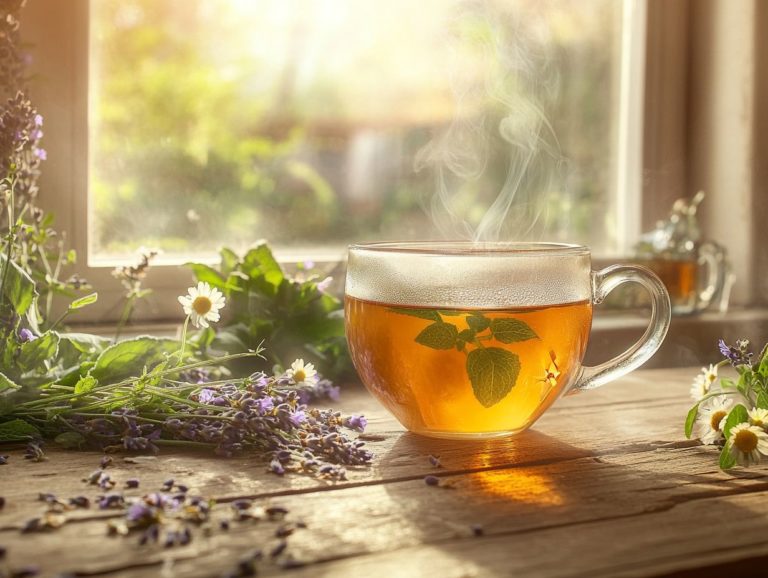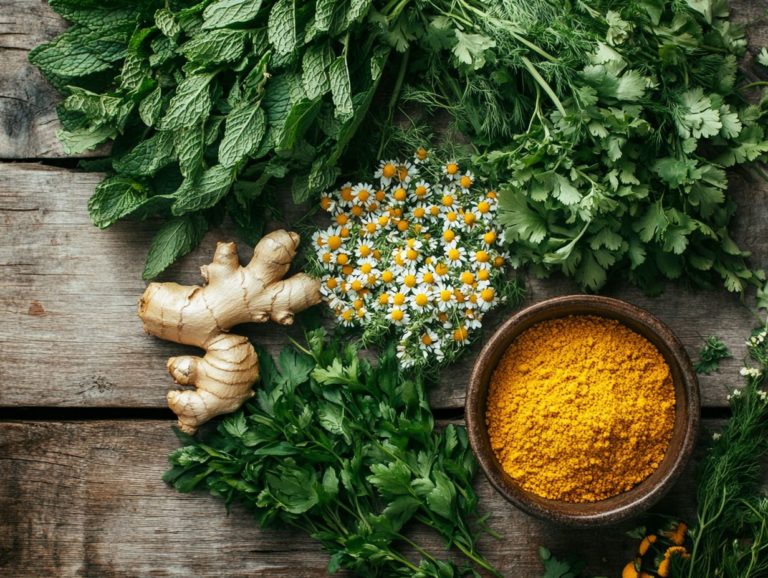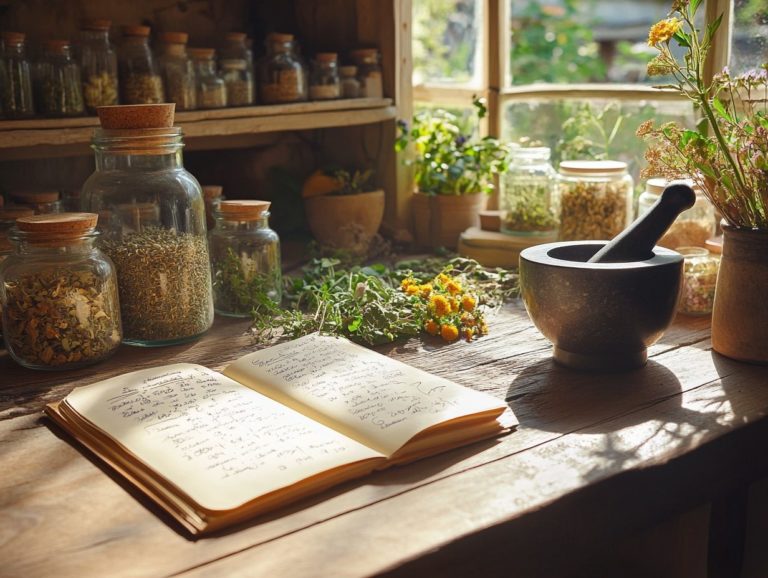Understanding Herbal Preparations: Infusions vs. Decocts
Herbal preparations have a rich history as natural remedies, presenting a myriad of health benefits at your fingertips.
In this exploration, you ll delve into two primary methods: infusions and decoctions. Discover the art of creating each one and unearth the unique advantages they offer.
From the gentle craft of a soothing infusion to the bold essence of a decoction, this guide illuminates the essential distinctions, empowering you to select the ideal preparation method for your wellness journey.
Dive in now to discover the fascinating world of herbal techniques!
Contents
Key Takeaways:
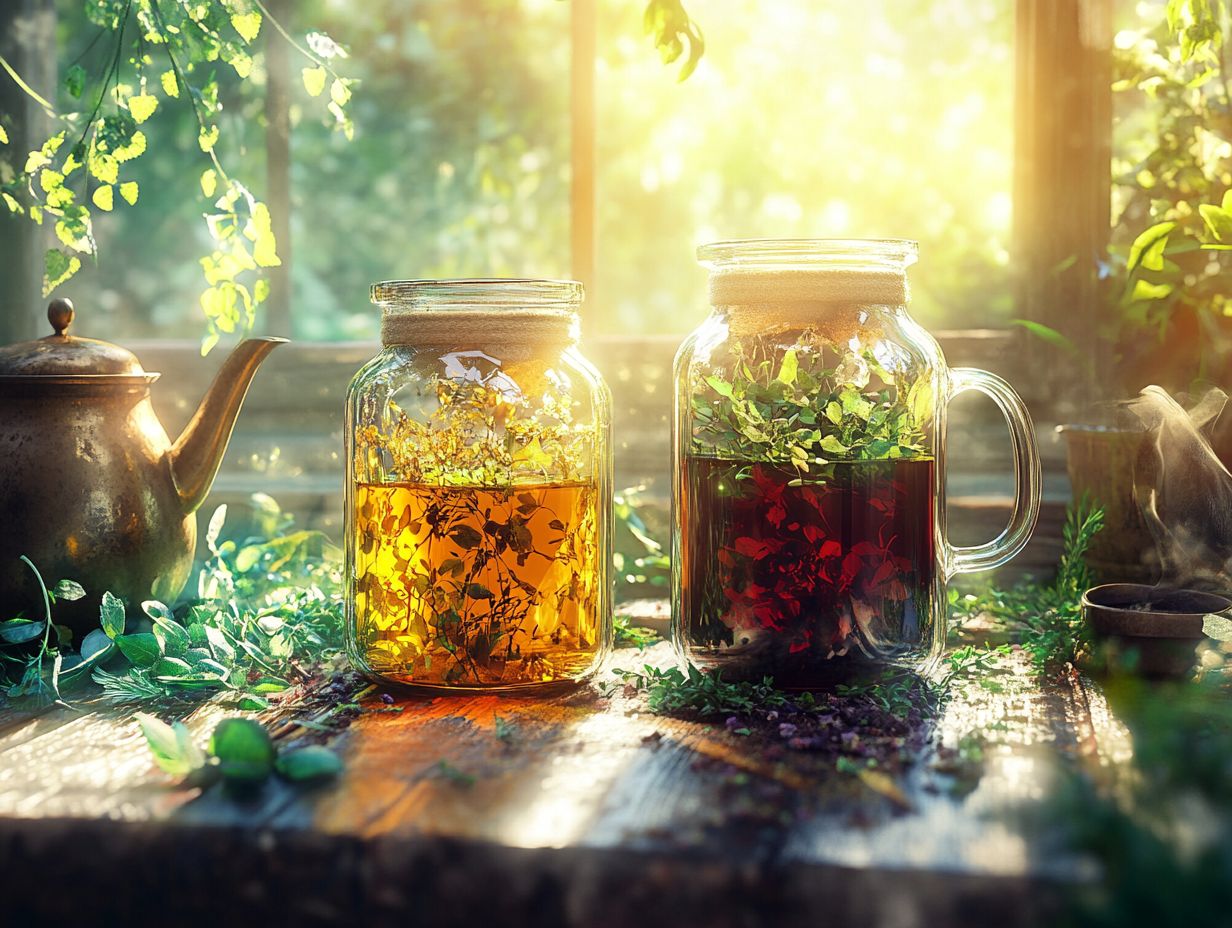
- Infusions and decoctions are both herbal preparations that offer unique health benefits.
- Infusions involve steeping herbs in hot water, while decoctions involve boiling herbs in water for a longer time.
- Factors such as the type of herb and desired outcome should be considered when choosing between an infusion or a decoction.
What are Herbal Preparations?
Herbal preparations are essential elements of herbal medicine, made from different healing plants to provide health benefits. You ll find these preparations in numerous forms, such as herbal teas, syrups, and tinctures, each employing unique extraction methods to maximize the therapeutic benefits of the plant materials.
By utilizing different parts of the plants like leaves, roots, and flowers you can create tailored remedies that address a range of health conditions, promoting a holistic approach to wellness. The art of crafting these preparations beautifully melds traditional knowledge with modern practices, making them an integral part of a natural, wellness-focused lifestyle.
For example, when you brew herbal teas, you re steeping dried leaves or flowers in hot water. This allows those beneficial compounds to infuse and release their properties. Conversely, tinctures are concentrated liquid extracts primarily obtained through alcohol or glycerin extraction, offering a more potent and easily digestible option.
Herbal practitioners are instrumental in guiding you toward the most suitable preparation for your individual needs. They often recommend products like echinacea for immune support or valerian root for relaxation, which are readily available at health food stores. Essential oils from herbs are popular for their aromatic and therapeutic benefits, enhancing both physical well-being and emotional balance.
Infusions: How They Work and Their Benefits
Infusions are an exquisite method for preparing herbal teas, expertly crafted to extract the medicinal compounds from plant materials and enhance their therapeutic properties. This elegant water-based extraction technique involves steeping fresh or dried herbs in boiling water, allowing their essential oils and nutrients to gracefully dissolve into the liquid.
The resulting infusion not only offers the health benefits of the herbs but also delivers a flavorful and aromatic beverage. This is perfect for savoring daily as part of your commitment to a natural lifestyle.
The Process of Making an Infusion
The process of crafting an herbal infusion is both straightforward and immensely gratifying. It invites you to carefully choose your plant materials, boil the herbs, and let them steep in hot water to draw out their beneficial properties. Start by selecting high-quality dried or fresh herbs tailored to your health needs, whether it s relaxation, digestion, or boosting immunity.
Once you ve measured the right dosage, boil some water, pour it over the herbs, and allow them to steep for a designated time to unlock their flavors and benefits.
When selecting your herbs, consider exploring local markets or fresh herb gardens to discover seasonal options that enhance both taste and effectiveness. Fresh herbs, when used daily, ensure that your infusion is brimming with optimal potency, transforming each cup into a refreshing and nutrient-rich experience.
The steeping time can vary based on the type of herb, typically ranging from five to fifteen minutes. Delicate herbs require less time, while sturdier varieties may need a bit longer. This approach allows you to savor a flavorful infusion that perfectly aligns with your specific wellness goals.
Try making your own herbal infusion today and experience the benefits!
Benefits of Infusions for Health
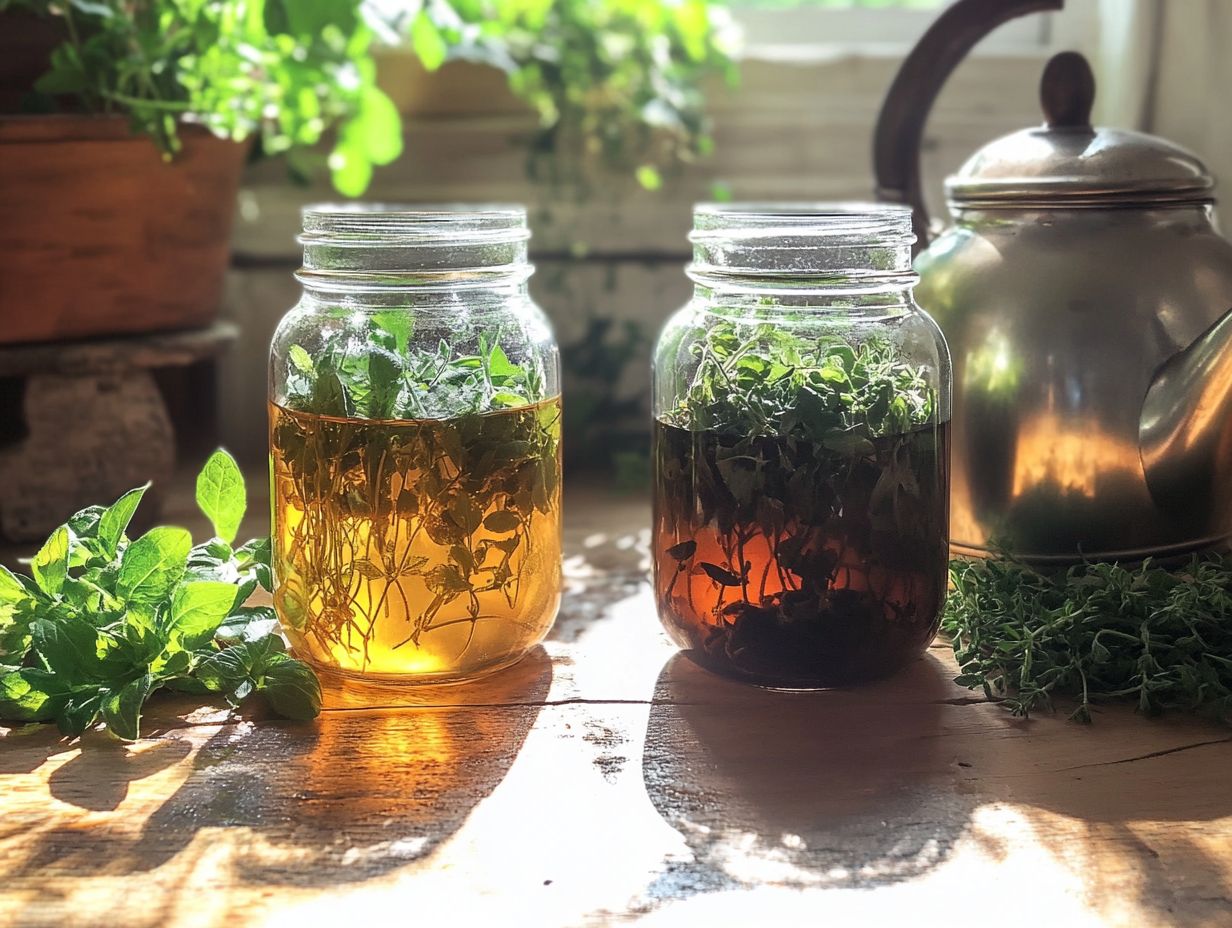
Herbal infusions offer a wealth of health benefits, serving as natural remedies for various chronic conditions and enhancing overall wellness with their therapeutic properties. When you gently extract the healthy compounds from herbs such as Dandelion, Burdock root, and Hibiscus, you create a nutrient-dense beverage that aids digestion, boosts immunity, and promotes relaxation.
Regularly sipping these medicinal teas keeps you hydrated and enriches your body with vital plant-based chemicals that help your body that support holistic health.
Renowned herbalist Juliet Blankespoor highlights that these infusions can help alleviate specific ailments, including anxiety and inflammation. For example, Chamomile tea is your go-to for easing sleep disturbances, while peppermint tea works wonders for digestive issues like bloating and gas.
Research shows that Hibiscus tea can help lower blood pressure, and Burdock root is celebrated for its detoxifying properties, potentially benefiting liver health.
By weaving these delightful brews into your daily routine, you may discover improved well-being and a natural approach to supporting your health.
Decocts: How They Differ from Infusions
Decoctions offer a unique approach to harnessing the essence of sturdier plant materials, such as roots and barks. Boiling these herbs in water for an extended period creates concentrated herbal remedies that pack a punch.
Unlike infusions, which are best suited for delicate leaves and flowers, decoctions excel at extracting beneficial compounds from tougher plant parts. This method is critical in traditional herbal practices, amplifying the medicinal properties and providing powerful solutions for various ailments and chronic conditions.
The Process of Making a Decoct
Making a herbal decoction is straightforward. Begin by measuring your desired amount of tougher plant materials think roots, seeds, or barks and place them in a pot filled with cold water.
Gradually bring the mixture to a boil, then reduce the heat and let it simmer for about 20 to 30 minutes. This slow extraction ensures that the beneficial compounds infuse the liquid effectively.
For the best results, a commonly recommended water ratio is 1:10, meaning one part herbs to ten parts water. This balance maximizes extraction while preserving the potency of your decoction.
When choosing plant materials, consider using robust roots like ginger or dandelion for their strong effects. Seeds like fennel provide a gentler touch. Opting for fresh, high-quality ingredients is essential for unlocking the full potential of your herbal remedy.
As your concoction simmers, cover the pot. This simple step prevents the loss of volatile oils, which are essential for the healing properties you seek. By following this guide, you can create herbal remedies that not only taste delightful but effectively support your health needs.
Benefits of Decocts for Health
Herbal decoctions offer an impressive range of health benefits, especially if you’re looking for powerful plant medicine solutions for chronic conditions like inflammation or digestive issues. Boiling these roots and barks extracts their full health benefits, yielding a rich source of bioactive compounds that can bolster immune function, improve digestion, and enhance overall health.
Incorporating herbal decoctions into your daily routine is simple and rewarding. A ginger and turmeric decoction boasts well-documented anti-inflammatory properties, as noted by experts in the field (Source: American Herbalists Guild), making it the perfect drink to kickstart your day!
A chamomile decoction can soothe digestive issues and promote restful sleep. Whether you savor these brews as a morning ritual or an evening wind-down, they significantly enhance your body’s natural healing processes.
Choose herbs that match your needs for a personalized health boost!
Choosing the Right Preparation Method for Your Needs
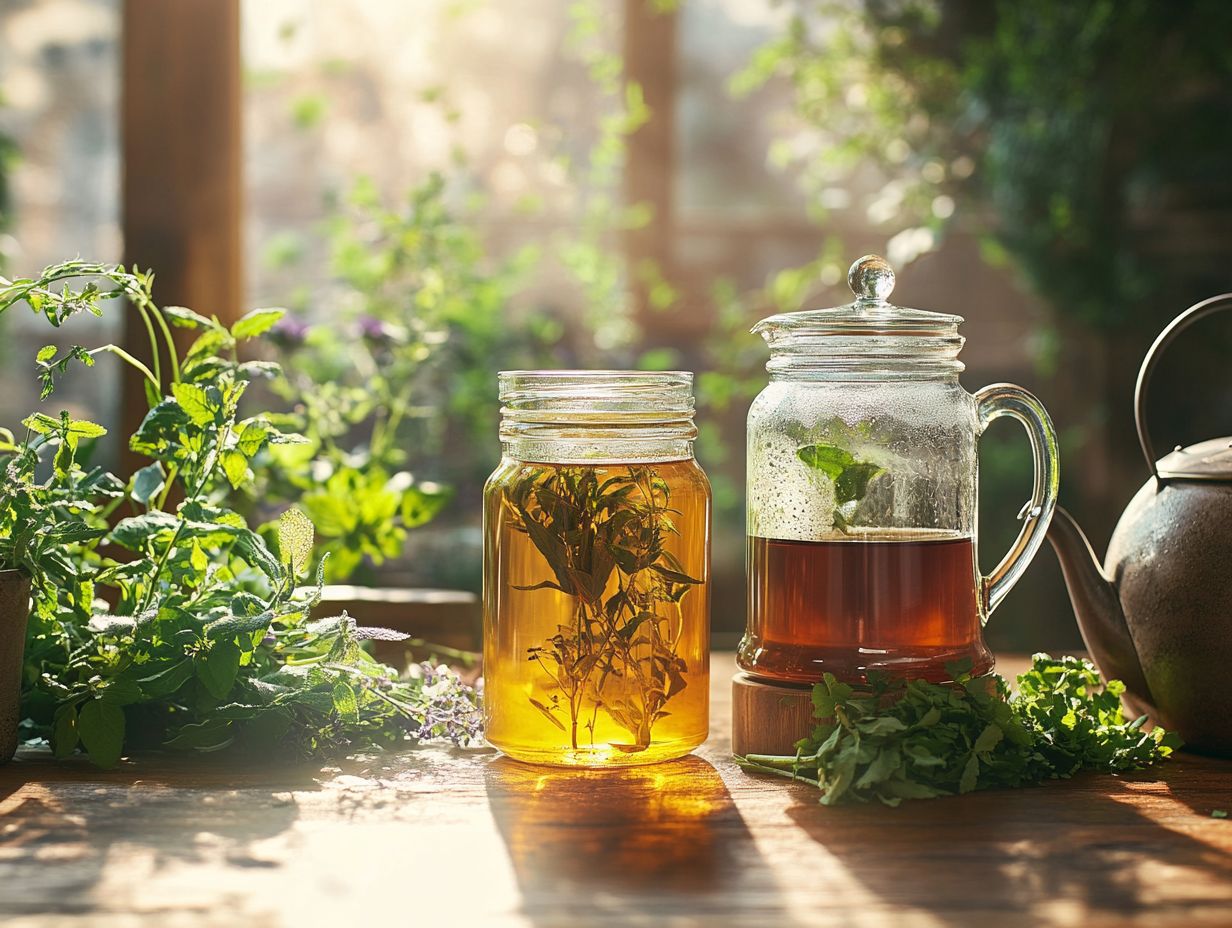
Selecting the ideal herbal preparation method tailored to your needs is essential for unlocking the full health benefits of herbal remedies. Each method whether infusion or decoction has its own distinctive characteristics and applications.
Consider the type of plant materials you intend to use, the specific health conditions you wish to address, and the strength you desire from your preparation. Engaging with a skilled herbal practitioner, someone trained in the use of herbs for health, can offer valuable insights, guiding you toward the most effective preparation aligned with your personal wellness objectives.
Factors to Consider
When selecting the right herbal preparation method, keep in mind some key factors:
- Type of herbs: Consider whether delicate or robust herbs are being used.
- Desired dosage: Evaluate how much you need to consume.
- Health benefits: Assess what you hope to achieve with herbal remedies.
It s essential to evaluate whether a quick infusion is suitable for delicate herbs or if a strong decoction is necessary for more robust roots and barks. Understanding the proper dosage and frequency of consumption will enhance the effectiveness of your herbal preparations.
Consider any existing health conditions or potential interactions with medications, as these can significantly influence which methods and herbs are safe for you. Personal preferences, such as taste and convenience, are important too; you might find that tinctures or capsules suit you better than teas for their ease of use.
By taking all these factors into account, you can navigate the diverse world of herbal remedies more effectively, ultimately finding the most suitable and impactful options for achieving optimal health and wellness.
Frequently Asked Questions
What is the difference between infusions and decocts?
Infusions and decocts are both methods of preparing herbal remedies, but they differ in how they extract the medicinal properties from the herbs. Infusions use hot water, while decocts employ boiling water and longer steeping times.
When should I use an infusion versus a decoct?

This will depend on the type of herb and its intended use. Infusions work best for delicate herbs and extracting volatile oils, while decocts are suitable for tougher herbs that require more concentrated properties.
How do I make an infusion?
To make an infusion:
- Pour hot water over the herbs.
- Allow it to steep for 5-10 minutes.
- The typical ratio is 1 teaspoon of dried herbs to 1 cup of hot water or 1 tablespoon of fresh herbs to 1 cup of hot water.
Strain and enjoy.
How do I make a decoct?
To make a decoct:
- Place the herbs in a pot with cold water and bring it to a boil.
- Reduce heat and let it simmer for 20-30 minutes.
- The typical ratio is 1 teaspoon of dried herbs to 1 cup of water or 1 tablespoon of fresh herbs to 1 cup of water.
Strain and enjoy.
What are the benefits of using infusions and decocts?
Both methods are effective for extracting the medicinal properties of herbs and can provide various health benefits. They are easy to make at home and can be customized to suit your individual needs.
Can I use infusions and decocts interchangeably?
It is not recommended to use these methods interchangeably, as they have different strengths and are suited for different types of herbs. Following the recommended method for each herb ensures maximum effectiveness.
Ready to explore the world of herbal remedies further? Dive in and discover how you can enhance your health and wellness journey!

